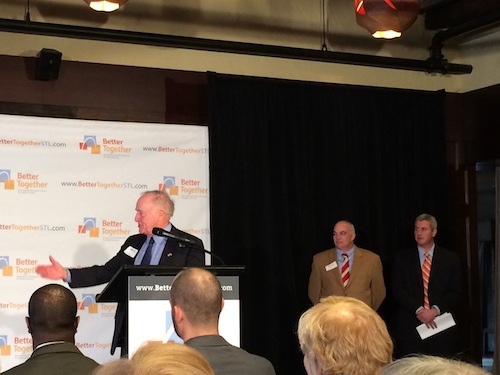Better Together St. Louis Raises My Suspicions
I’m generally in favor of reducing the number of government entities in the St. Louis region. The 2011 Where We Stand report (p88) sums up the numbers:
We rely on local government for a wide array of services including public education, health and safety, infrastructure, environmental protection and sanitation, public housing, and arts and cultural support.
• The St. Louis region continues to be ranked in the top three for overall number of governmental units, as well as for the ratio of governments to population.
Depending on perspective, the region’s local government structure can be seen as the 3rd most fragmented or the 3rd most accessible to its citizens and businesses.
• With 884 individual units of government,
St. Louis ranks 3rd only to Pittsburgh and Denver among our peer regions in ratio of local governments to citizens.
For the 35 peer regions, the average number of governmental units has decreased from 399 in 2002 to 379 in 2007.
• Of the 35 regions, 20 have fewer governmental units in 2007 than they had in 2002.
In the St. Louis region, the number of units of local government continues to increase.
• Less than half of local government units in the St. Louis region are general-purpose governments, such as counties, municipalities, and townships.
• In 2007, the St. Louis region had 9.8 municipalities per 100,000 population, up from 8.9 municipalities per 100,000 in 2002.
A majority of area local governments have been established for specific functions, including school districts, special taxing districts, or other special district governments.
• Almost all of these special district governments perform a single task, such as drainage and flood control, soil and water conservation, fire protection, water supply, or housing and community development.
• The St. Louis region’s ratio of school districts per population ranked 2nd in 2007 with 4.8 per 100,000 population; slightly lower than the 5.0 per 100,000 reported in 2002.
I’m of the belief that more units of government isn’t necessarily a good or bad thing, just as fewer isn’t necessarily a good or bad thing. I do know the St. Louis region
- Contains roughly 2.8 million people
- Less than half (46%), 1.3 million, live in St. Louis City & County
- The job market remains sluggish
- Tax incentives have been ineffective at economic development.
- 137 years since St. Louis City removed itself from St. Louis County, residents of both entities have very strong, mostly negative, feelings about the other. Those in the rest of the region hold similar views about one or both.

With this in mind you might think I’d be a cheerleader for the new Better Together Saint Louis effort.
Sponsored by the Missouri Council for a Better Economy, Better Together is a grassroots project born in response to growing public interest in addressing the fragmented nature of local government throughout St. Louis City and County, which dates back to 1876, when St. Louis City broke away from St. Louis County.
The resulting absence of a cohesive governmental structure left a void and many smaller governments formed to fill it. This is why the 1.3 million people who call St. Louis home are served by 116 local governments, which include St. Louis City and County, as well as 91 municipalities and 23 fire districts. The costs associated with funding all 116 governments (excluding airport and water service fees) has reached a staggering $2 billion per year. To-date, there has been no comprehensive single study that has looked across the City and County to determine whether the region could improve both service and cost by streamlining and eliminating redundancies and better serve the people of St. Louis.
Better Together is neither putting forth nor advocating for a specific plan to such end, but rather seeks to act as a facilitator, a resource for information and tools, and a catalyst to spark discussion. Accordingly, we will drive an inclusive, transparent process of developing and assembling valuable information other organizations can use to craft their own plans for what the future of the region should look like, as well as judge plans put forth by others.
I remain a skeptic for a variety of reasons:
- As I explained earlier, the region is much larger and more complex than just St. Louis City & County.
- The Missouri Council for a Better Economy was started by Rex Sinquefield, a billionaire seeking to alter tax policy in his favor.
- “Sponsored by” and “grassroots” in the same sentence! Really, how exactly does that work? Sounds like this might be astroturfing.
- Just collecting data for the community to decide what to do with it, but the name and MCBE clearly shows reunification as the intent. Plus, data from the many school districts isn’t being collected because they don’t want to get “bogged down.” If the mission is to collect data on how tax money is being spent it makes sense to look at it all — what’s the hurry?
Let’s dig a bit deeper into the above reasons I listed.
Region:
Forty-six percent of the region’s population isn’t the region. Granted, this 46% live in the city or county that carry the region’s name. Still, I think something well over 50% is required to discuss a topic as regional in nature. Better together is clearly focused on the City of St. Louis and St. Louis County only, not the region.
MCBE:
From their “About Us” as of 8:30am yesterday “The studies were funded by MCBE, whose sole donor until now has been Rex Sinquefield, a retired investment fund executive and philanthropist.” Oh but they told me he hasn’t given any money in a year. Rex is a fan of chess and I can see a strategy playing out of him giving enough money to fund MCBE for a couple of years — that way it can be paid he’s the sole donor from the past, but not now. Question for MCBE, how many donors since the last donation from Rex?
Grassroots:
Calling yourself grassroots doesn’t mean you’re actually a grassroots movement. The Better Together STL materials indicate it’s a project of MCBE, not a separate organization. I didn’t find any such organization listed with the Secretary of State. The website does list a board which is comprised of the powerful & elite of local politics and business. Also on this “board” — Rex’s Chief of Staff. Those in attendance at the kickoff represent more of the same — nothing remotely grassroots about it.
Data:
Several issues here. The speakers all said they’re just collecting data so we know what we spend and where — sounds reasonable. But everywhere you look at Better Together and MCBE the final goal is clear — unification of some sorts. And schools are a big part of where our tax money is spent and school districts are governmental entities just like fire protection districts, we should look at education too if the goal is an honest self evaluation.
While I support reducing the number of units of government my goal isn’t to provide the same services for less money, as was stated several times. My goal would be to provide more services distributed more evenly for the same money.
Unfortunately, I see Better Together & MCBE as a backdoor to Rex’s radical tax policies — no state income taxes, no city earnings taxes, higher property & sales taxes. The wealthy’s fantasy to get out of paying their share, they can easily buy any services the community can’t afford to provide. Some will claim this has bipartisan support, but our Democrats are often that in name only, they’re as fiscally conservative policy-wise as far-right Republicans. I keep hoping a local version of Bernie Sanders will appear. I want to believe this is an altruistic effort, but I’m not gullible.
I’d like to see an actual grassroots effort look at our region with an open mind — perhaps even concluding nothing should change with respect to the relationship between the city & county.
— Steve Patterson
 The Missouri Department of Transportation (MoDOT) says it needs more money than it receives:
The Missouri Department of Transportation (MoDOT) says it needs more money than it receives:

